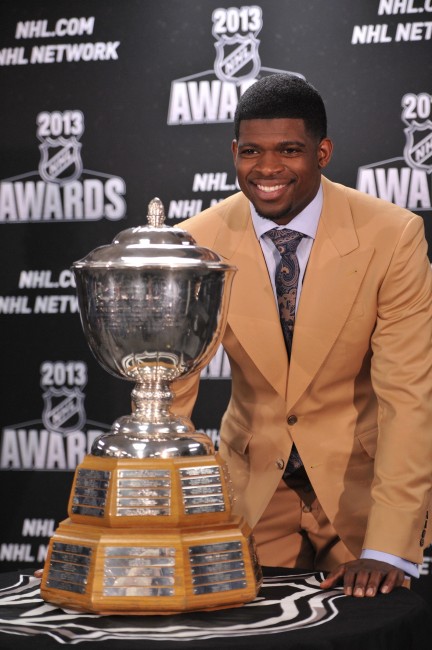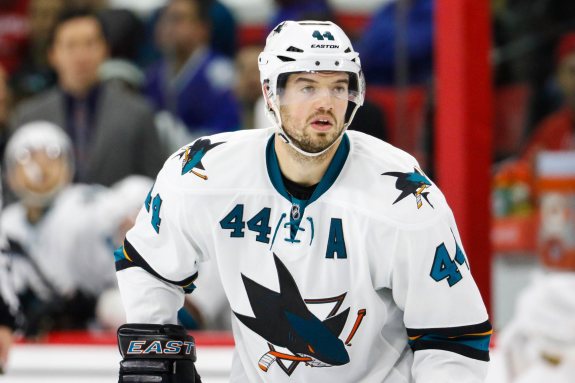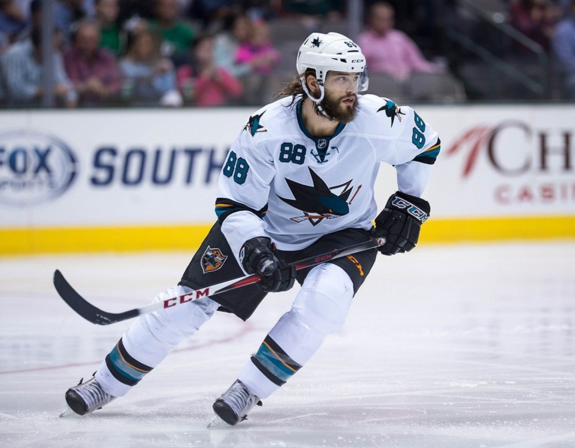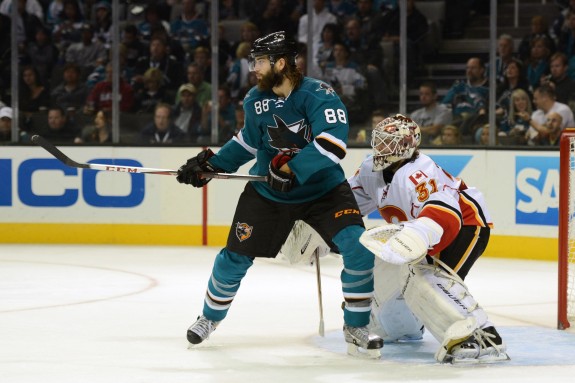The James Norris Memorial Trophy is awarded every year to the “defense player who demonstrates throughout the season the greatest all-round ability in the position.” A lot of the time, however, this does not mean the best defensive player in the NHL. In fact, it hardly ever means that. This season, there is a microcosm of this choice taking place: Brent Burns and Marc-Edouard Vlasic. The Norris debate in San Jose exemplifies the problem with the Norris debate as a whole.
The Patterns of Past Winners
In the last four years, we have seen some very famous names win the Norris Trophy. Duncan Keith, PK Subban, Erik Karlsson, and Nicklas Lidstrom were the recipients the last four seasons. Let’s check out the stats that won them the hardware.
| Goals | Assists | Points | CF% | GF% | SV% | SF% | +/- | ||
| Duncan Keith | 6 | 55 | 61 | 56.6 | 56.7 | 91.4 | 55.7 | 22 | |
| P.K. Subban** | 11 | 27 | 38 | 56.5 | 66.0 | 93.0 | 58.7 | 12 | |
| Erik Karlsson | 19 | 59 | 78 | 54.8 | 55.5 | 91.9 | 53.0 | 16 | |
| Nicklas Lidstrom | 16 | 46 | 62 | 51.2 | 50.9 | 92.0 | 49.9 | -2 | |
All advanced stats are taken from war-on-ice.com and are 5v5 even strength.
**Lockout-shortened season

So, we can conclude a couple of things from this data. First, points are a requirement to win this thing. Subban was the first winner to score under 50 points since Rod Langway of the Capitals from the 1983-84 season. For your information, his 38 points is on pace for 65 in a full season.
Second, your goalie has to be happier to have you on the ice. Each player’s save percentage is over .913 (the average save percentage in the NHL during this span). This stat implies that you are keeping opponents’ high quality chances down.
Third, the Norris Trophy does not care if you prevent the other team from shooting or even scoring to an extent. At five-on-five, Nicklas Lidstrom actually allowed more shots than his team generated. His goals for percentage isn’t great either, just barely positive at 50.9%. Oh, and his goal differential? That plus/minus rating was actually negative.
The Guys They Beat
You read that right, to be awarded as the best defender in the NHL, you don’t need to be good at defense. In 2010-11, Lidstrom won his seventh Norris Trophy with a -2 rating and his reputation alone. But did Lidstrom’s win mean someone more deserving missed out?

In second and third place that season were Shea Weber and Zdeno Chara. Both of those guys couldn’t muster that fifty point benchmark, but had positive differentials (+7 and +33 respectively). They also boast superior advanced stats (CF%, GF%, etc.). This brings us to San Jose.
Sharks Private Norris Debate
Enter Marc-Edouard Vlasic and Brent Burns. Two current defenders on Team Teal. One is a shut-down blue liner while the other moves the puck and blasts slapshots like there’s no tomorrow. My colleague, Andrew Bensch, doesn’t think Burns should even be back on the blue line he plays so offensively. But let’s see who would be more likely to win the Norris if the NHL was the size of the Sharks roster.
When we take a look at the primary statistics, Vlasic doesn’t look all that special:
| Marc-Edouard Vlasic | Brent Burns | |
| Goals | 6 | 11 |
| Assists | 8 | 23 |
| PP Points | 2 | 13 |
| TOI/G | 22:04 | 23:42 |
| +/- | 11 | -9 |
The only real advantage Pickles has over his hairy teammate is the oft-criticized plus/minus category. Vlasic struggles offensively and that impacts his usage. He is not used on the top power play unit because his defensive strengths are not as useful. In terms of the Norris debate, these numbers hold more weight. Projected stats have Vlasic failing to eclipse 30 points. Brent Burns on the other hand is slated to come close to 70 points. He is currently 3rd among D-men in points.

While formidable on offense, Brent Burns is almost the polar opposite on the other side of the puck. For these stats, we have to venture into the advanced categories.
| Marc-Edouard Vlasic | Brent Burns | |
| CF% | 52.1 | 52.6 |
| SF | 344 | 370 |
| SA | 315 | 357 |
| SF% | 52.6 | 50.9 |
| GF | 29 | 28 |
| GA | 23 | 37 |
| GF% | 55.8 | 43.1 |
| SV% | 92.7 | 89.6 |
Similar to the previous chart, there is a clear winner here. Vlasic dominates these categories (even strength 5v5) as the shut-down defenseman. The shots category is very telling. With Burns on the ice, the rubber flies a lot more. Burns’ defensive unit allows more shots than Vlasic’s even generates. Yet, not only does Vlasic’s unit allow fewer goals, they even score more.
Brent Burns turned heads last season as a bull in a China shop. He wrecked havoc on the ice and it was great to watch. However, that was as a forward. Defenders, in the most basic meaning of the word, must negate chaos.
Who is Our Winner?
That last chart may look like Burns is pitiful on the blue line, but it can’t be discounted how valuable he is offensively. Take a quick peek at some of the worst power play teams in the NHL. Buffalo and Edmonton sit at the very bottom of the pack. A common factor between them? Their defenders are near transparent on the scoresheet. Edmonton’s Justin Schultz is the only player above 11 points. Buffalo doesn’t have a single blue liner in double digits, and their power play percentage is sad as well.
Brent Burns is lethal on the man-advantage. He is in the top ten in points on the power play, he is tops in Corsi For%, and he is tied for third in goals scored. That bomb of a slapshot is worth its weight in gold.

The Norris debate ends with a controversial decision. Vlasic is clearly the better defensive defender, but he pales in comparison with the puck on his stick. Burns is far and away the more gifted shooter, but his defensive play is comical at times. However, the trophy has become more offensive than defensive. Even current favorite, Drew Doughty, is on his way to a 50+ point season. Unless Vlasic can up his point production, Burns will still be ahead of him.
I think given Burns’ team very negative +/- you CAN discount the value of his offensive contributions. Because the math so markedly does and then some.
Thanks for the read and feedback. His negative numbers are very serious, but those numbers are not reflective of his entire game. +/- is not affected by power plays and penalty kills. This is about 20% of a game we leave out! So, yes, Burns is MILES behind most defenders defensively, but his offensive output is strong. 13 points to Vlasic’s 2. That’s 11 points separating them that aren’t counted in plus/minus and 5v5 stats
SJS made a very smart move with Burns on defense on the PP and at forward while even strength. Minimizing his defensive liabilities and increasing his offensive opportunities. Only problem last season was they let the injury degraded Boyle run the top PP unit instead of Burns. But this year, they needed to make changes because the GM, Doug Wilson, promised the owner there’d be major changes — if he hadn’t, Wilson would have been fired. Burns to the blue line is what happens when a GM panics to placate his boss to save his job. In no way should Burns be even an All Star, let alone a Norris candidate. Vlasic is the better d-man and its not close. That said, who wants to watch a shut down defenseman at an All Star game? For entertainment purposes, Burns runs away with it!!
Thanks for the read and comment. You’re right and that was the point I was looking for. Vlasic may be the better defensive player, but until he generates some offense, Burns will always be considered ahead of him. Which is just insane
Actually just go out and get another d man to replace Burns. Get that animal forward please
Burns should just QB the power plays then play forward on reg shifts.
Thanks for the read and feedback, Paul. It’s an interesting compromise, but unfortunately the Sharks are already sadly thin at D. Not a lot of decent two way D-men are available yet either. When teams start selling, maybe a more permanent move can be made